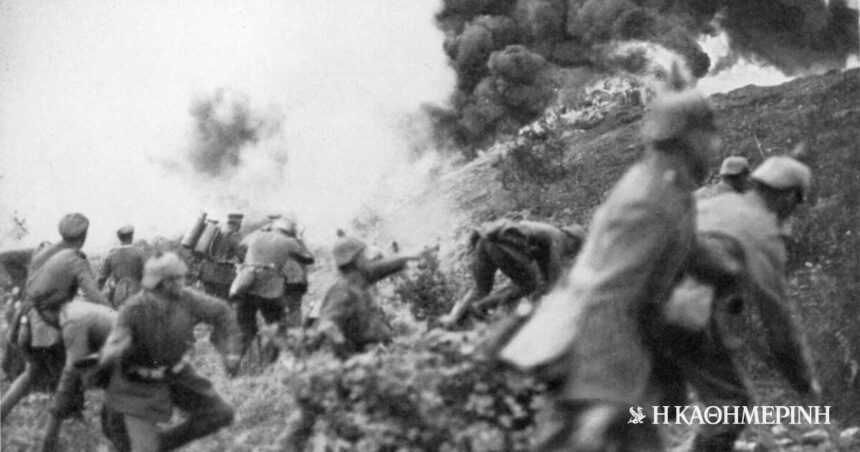“Not more than 200 meters above our heads, two enemy planes fly back and forth, taking all the time they need to observe the ground below. We play the dead bugs, lying in a messy heap at the bottom of the trench with the real corpses above us, arms outstretched and mouths open, to give the onlookers the impression that all the village’s defense forces have been killed and that our defense lines are now nothing more than a vast graveyard,” wrote a French lieutenant with the initials J.-P. in 1916.
J.-P. he is one of over 1,100,000 Frenchmen called to fight at the Battle of Verdun. Lasting almost ten months and with losses, injuries and capture of 700,000 soldiers on both sides, the Battle of Verdun was one of the bloodiest and longest battles of World War I.
By late 1915, the war seemed to have reached a stalemate. The Allies had failed to break the German forces, and their setbacks at Artois and Campania convinced the German Army Commander-in-Chief Erich von Falkenhayn that his troops could not be broken. Wanting to return to a war of movement rather than position, Falkenhayn believed that the only way to damage the British was to damage the French beyond repair. Following the ‘strategy of attrition’, he intended to ‘bleed France’: to break up the French army by attacking a geographically difficult area where the British could not help them, leading them to conclude a separate peace.
Thus, on February 21, 1916, Falkenhein ordered extensive artillery bombardment and the steady advance of the men of the German Fifth Army under Crown Prince Wilhelm, with the final objective being the city of Verdun, near the Meuse River.
At 4 am, 1,200 German guns pulverize the first line of French defense in the trenches. Von Falkenhayn could now hope for a quick capture of Verdun. The choice of target was not accidental: Verdun was a city of military as well as political importance: it is a key area for the northern entrance to the Campania plain, through which one obtains direct access to Paris. Her loss would be a great blow to French morale. It also had symbolic significance: it was the first city to fall in the Franco-Prussian War (1870-71), which was disastrous for France. Since then, the French governments had invested in the fortification of the area, making it one of the most protected fortresses on the Franco-German border.
Despite the strong fortification of the area, however, the French staff had transferred most of the cannons of the Verdun fortresses to other fronts of the war, which they considered more pressing. Thus, to a large extent, the French commanders were caught off guard, but a few days of bad weather delayed the start of the German attack and gave them the necessary time to move two more divisions to Verdun. The German advance, however, seemed unstoppable. On February 25, the largest fortress of the complex, Dumont, had fallen, while by the next day the German forces had advanced almost 7 kilometers. Casualties approached 25,000 for each side, respectively.
Faced with an increasingly likely defeat, French army chief Marshal Joseph Joffre places General Philippe Petain (later leader of the Vichy State during World War II) in command of the Second French Army at Verdun. His administration manages to stabilize the front. Using one road – the only one left open for the supply of French troops, symbolically named the “Holy Road” – Pétain managed to rotate over 40 divisions and not keep the same troops on the Verdun front for long periods. He reorganized the artillery and threw himself into battle determined to inflict the greatest possible losses on the Germans.
The quick victory that the German leaders were counting on began to slip away. For many, the command of the German Fifth Army by Crown Prince Wilhelm, who disagreed with many of the military, made the German position difficult and bogged down the troops. Since the summer, events have been developing rapidly. July 1st begins the deadliest battle of World War I, the Battle of the Somme, in which the British, French, and German casualties exceed 1,200,000 men. The Germans were also being tested by the disastrous “Boroshilov Offensive”, the Russian Empire’s summer offensive on the Eastern Front. These new fronts forced the Germans to divide many of Verdun’s forces between them, significantly weakening their position.
Meanwhile, the stagnation of the troops was leading to such heavy daily losses that Field Marshal von Falkenhayn was replaced by a more aggressive general, Paul von Hindenburg (later president of the Second Reich during the Weimar Republic). On the French side, Philippe Petain was promoted and replaced by the also combative General Robert Nivelle, to whom the phrase “Ils ne passeront pas”, i.e. “They will not pass”, is attributed in an order he gave on June 23.
These realignments, and the reinforcement of the French by the Allies on other fronts, opened the way for a counter-attack. On 2 September Hindenburg orders the cessation of all offensive operations at Verdun, limiting himself to the defensive. Despite relentless German attacks with flamethrowers and poison gas, the French under General Nivelle counter-attacked in late October. Within a few days, on 24 October, they recaptured Fort Dumont and on 2-3 November Fort Fort. On December 15, the French launched their second counter-attack, after a six-day bombardment during which 1,169,000 shells were dropped. By 18 December the French forces had pushed the Germans back to the positions they had occupied on the morning of 21 February, before the battle began.
Verdun became a symbolic battle for the French, as one of their most heroic moments in World War I: it involved at times around 75% of the French army. von Falkenhayn’s plan to disband the latter not only failed, but the brilliant command of Zoffre, Petain and Nivel went down in history and gave the French forces the necessary impetus to continue the counterattack against an increasingly tired German army. . Today, more than a century later, the scars of the battle are still evident at Verdun: shell holes mark one of the places where the flower of Europe perished in the Great War.
Column editor: Myrto Katsigera, Vassilis Minakakis, Antigoni-Despina Poimenidou, Athanasios Syroplakis




